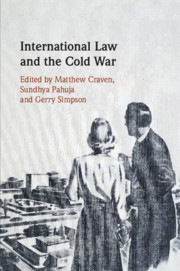Book contents
- International Law and the Cold War
- International Law and the Cold War
- Copyright page
- Dedication
- Contents
- Figures
- About the Editors
- About the Authors
- Acknowledgements
- 1 Reading and Unreading a Historiography of Hiatus
- Part I The Anti-linear Cold War
- Part II The Generative/Productive Cold War
- Part III The Parochial/Plural Cold War
- 16 The Cold War in Soviet International Legal Discourse
- 17 The Dao of Mao: Sinocentric Socialism and the Politics of International Legal Theory
- 18 ‘The Dust of Empire’: the Dialectic of Self-Determination and Re-colonisation in the First Phase of the Cold War
- 19 The ‘Bihar Famine’ and the Authorisation of the Green Revolution in India: Developmental Futures and Disaster Imaginaries
- 20 Pakistan’s Cold War(s) and International Law
- 21 International Law, Cold War Juridical Theatre and the Making of the Suez Crisis
- 22 To Seek with Beauty to Set the World Right: Cold War International Law and the Radical ‘Imaginative Geography’ of Pan-Africanism
- 23 John Le Carré, International Law and the Cold War
- 24 Postcolonial Hauntings and Cold War Continuities: Congolese Sovereignty and the Murder of Patrice Lumumba
- 25 End Times in the Antipodes: Propaganda and Critique in On the Beach
- References to Cold War Volume
- Index
24 - Postcolonial Hauntings and Cold War Continuities: Congolese Sovereignty and the Murder of Patrice Lumumba
from Part III - The Parochial/Plural Cold War
Published online by Cambridge University Press: 05 December 2019
- International Law and the Cold War
- International Law and the Cold War
- Copyright page
- Dedication
- Contents
- Figures
- About the Editors
- About the Authors
- Acknowledgements
- 1 Reading and Unreading a Historiography of Hiatus
- Part I The Anti-linear Cold War
- Part II The Generative/Productive Cold War
- Part III The Parochial/Plural Cold War
- 16 The Cold War in Soviet International Legal Discourse
- 17 The Dao of Mao: Sinocentric Socialism and the Politics of International Legal Theory
- 18 ‘The Dust of Empire’: the Dialectic of Self-Determination and Re-colonisation in the First Phase of the Cold War
- 19 The ‘Bihar Famine’ and the Authorisation of the Green Revolution in India: Developmental Futures and Disaster Imaginaries
- 20 Pakistan’s Cold War(s) and International Law
- 21 International Law, Cold War Juridical Theatre and the Making of the Suez Crisis
- 22 To Seek with Beauty to Set the World Right: Cold War International Law and the Radical ‘Imaginative Geography’ of Pan-Africanism
- 23 John Le Carré, International Law and the Cold War
- 24 Postcolonial Hauntings and Cold War Continuities: Congolese Sovereignty and the Murder of Patrice Lumumba
- 25 End Times in the Antipodes: Propaganda and Critique in On the Beach
- References to Cold War Volume
- Index
Summary
Whilst the role of the UN and the institutional space it opened for staging the Congo crisis are undoubtedly important for international law, this chapter focuses primarily on the political event of Lumumba’s 1961 assassination. Lumumba became the site of extensive Cold War anxieties and postcolonial aspirations, as an embodiment of the communist threat to some and of a pan-African future to others. His death provoked the ascription of an excess of meaning to a single politician, a victim standing metonymically for the broader violation of Congolese sovereignty. Both larger than life as a postcolonial martyr and overdetermined as a communist, Lumumba was a contested figure in the Cold War political imaginary.
Keywords
- Type
- Chapter
- Information
- International Law and the Cold War , pp. 533 - 558Publisher: Cambridge University PressPrint publication year: 2019
- 1
- Cited by

